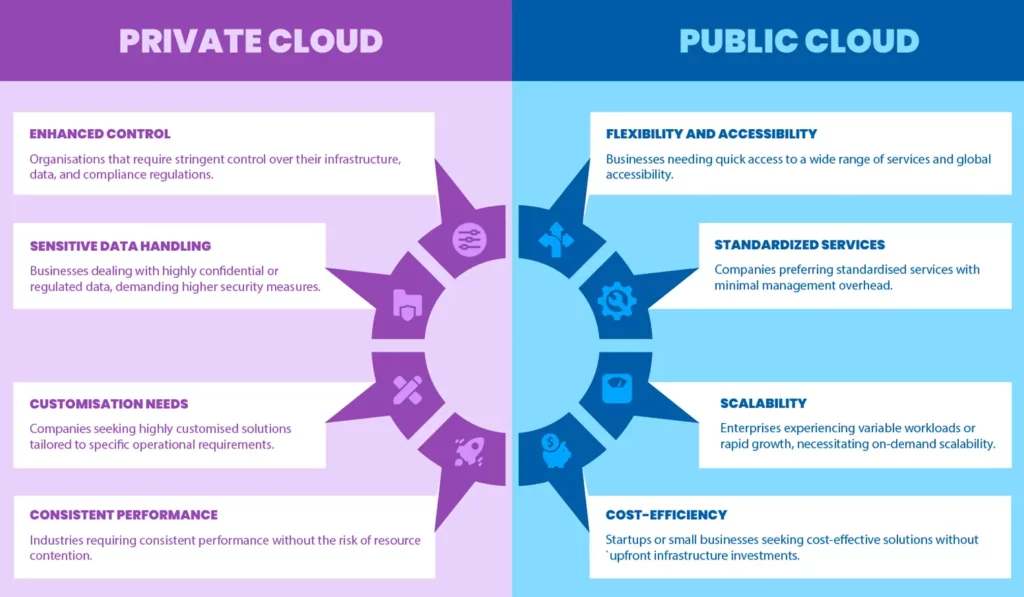In today’s dynamic business landscape, the choice between Private and Public Cloud infrastructures stands as a pivotal decision for organisations seeking scalable, secure, and efficient computing solutions. The advent of cloud technology has transformed the way businesses operate, offering diverse models to store, manage, and process data. At the heart of this evolution lie two primary models – private cloud and public cloud – each offering distinct advantages and catering to specific organisational needs.
Private clouds, characterised by its dedicated infrastructure either hosted on-premises or provided by a single cloud service provider, empower businesses with unparalleled control, heightened security measures and a customisable environment. Conversely, public clouds, offered by third-party vendors on a shared, pay-as-you-go basis, offer scalability, cost efficiency and ease of access.
The decision to opt for either a private or public cloud model hinges on multifaceted considerations, ranging from data security and compliance requirements to budget constraints and scalability needs. Understanding the nuances and functionalities of each model is crucial in aligning the chosen infrastructure with the unique objectives and operational demands of an organization.
Also Read – Cost-Efficiency in Private Cloud Infrastructures: Strategies and Best Practices
In this exploration of “Private Cloud vs. Public Cloud,” we delve deep into the characteristics, comparative analysis, and key considerations surrounding these cloud paradigms. By navigating through their features and implications, businesses can make informed decisions to select the ideal cloud model that best suits their operational requirements and long-term aspirations.
Comparison between Private Cloud vs Public Cloud
| Private Cloud | Public Cloud | |
| Ownership & Accessibility | Owned and operated by a single organisation, providing exclusive accessibility to dedicated resources. | Shared infrastructure accessible to multiple users on a pay-as-you-go basis. |
| Security & Control | Offers greater control over security protocols, data isolation, and compliance adherence due to dedicated infrastructure. | Relies on service provider security measures with limited control, albeit backed by robust security features. |
| Customisation & Performance | Allows extensive customisation, tailored performance configurations, and consistent resource availability. | Provides standardised offerings with limited customisation but assures scalability and flexibility. |
| Cost & Scalability | Higher initial investment and operational costs; scalability may require hardware procurement and setup. | Lower initial investment, pay-as-you-go model, and seamless scalability based on resource needs. |
| Resource Sharing & Multi-Tenancy | Dedicated resources reduce the risk of resource contention and performance fluctuations caused by multi-tenancy. | Shared infrastructure occasionally encounters resource contention issues, impacting performance during peak usage times. |
| Compliance & Data Governance | Offers stringent control over data governance, meeting specific industry compliance requirements effectively. | Compliance adherence relies on the service provider’s certifications and assurances. |
| Reliability & Uptime | Higher reliability due to dedicated resources, minimising the risk of downtime and service disruptions. | Offers high uptime but may face occasional downtime due to shared infrastructure. |
| Management & Maintenance | Requires extensive in-house management and maintenance, including hardware upgrades and security protocols. | Managed services with minimal maintenance responsibilities, handled by the service provider. |
Private Cloud vs. Public Cloud: Choosing the Ideal Model for Your Business

The choice between a Private and Public Cloud hinges on multiple factors, each catering to different business needs. Here’s an exploration to help determine the ideal model for your business:
Private Cloud is suited for:
Enhanced Control: Organisations that require stringent control over their infrastructure, data, and compliance regulations.
Sensitive Data Handling: Businesses dealing with highly confidential or regulated data, demanding higher security measures.
Customisation Needs: Companies seeking highly customised solutions tailored to specific operational requirements.
Consistent Performance: Industries requiring consistent performance without the risk of resource contention.
Public Cloud is ideal for:
Cost-Efficiency: Startups or small businesses seeking cost-effective solutions without upfront infrastructure investments.
Scalability: Enterprises experiencing variable workloads or rapid growth, necessitating on-demand scalability.
Standardised Services: Companies preferring standardised services with minimal management overhead.
Flexibility and Accessibility: Businesses needing quick access to a wide range of services and global accessibility.
Also Read – Creating a Cloud Exit Strategy: A Guide to Cloud Repatriation
Ultimately, the choice depends on your business’s unique requirements, balancing factors like control, security, cost, scalability, and specific industry needs. Some businesses opt for a hybrid approach, leveraging both models to maximise benefits. Assessing these factors will help determine the ideal cloud model aligning with your business objectives and long-term growth strategies.
How Can Apiculus Help with Private and Public Clouds?
Apiculus stands as a guiding force, offering tailored solutions and expertise to businesses venturing into the realm of private and public cloud environments. In the dynamic landscape of digital infrastructure, the choice between private and public Clouds often presents a pivotal decision for businesses seeking optimal performance, security, and scalability. Apiculus, as a trusted partner, provides comprehensive support, leveraging its extensive experience and innovative solutions to streamline the adoption and management of both cloud models. Whether steering towards the exclusive control of a private cloud or harnessing the agility of a public cloud, Apiculus offers tailored strategies, robust infrastructure, and expert guidance, empowering businesses to make informed decisions aligned with their unique goals and industry standards.

Kshitish is a ‘startup expert’ and has been involved with early stage startups, seeing various phases of growth, for more than 15 years. A specialist in Product Management, User Experience, Technology and Product Growth/Strategy, Kshitish is a seasoned entrepreneur with deep expertise in building enterprise products and horizontal/vertical SaaS. Kshitish did his PG in Product Design from NID, Ahmedabad.

